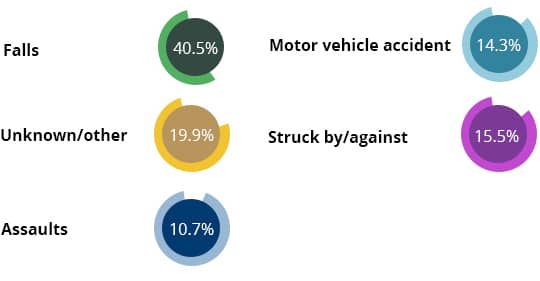Causes Of Brain Injury
 Traumatic brain injury (TBI) may result from a bump, blow or jolt to the head or an object penetrating the skull. An estimated 30 percent of all injury deaths in the U.S. are attributed to TBI, according to the Centers for Disease Control and Prevention (CDC).
Traumatic brain injury (TBI) may result from a bump, blow or jolt to the head or an object penetrating the skull. An estimated 30 percent of all injury deaths in the U.S. are attributed to TBI, according to the Centers for Disease Control and Prevention (CDC).
A survivor of such an injury will often face significant challenges. TBI can lead to impairments in cognitive abilities and motor skills, long-term vision or hearing problems and emotional issues such as depression and outbursts of anger.
Some victims are able to recover some or all of their abilities. However, others may be left with permanent disabilities or remain in a vegetative state with no hope of improvement.
Learn about the differences between a TBI vs Non-TBI in this article
Causes of Brain Injury
Based on data from 2006 to 2010, the CDC identifies the following as the leading causes of TBI-related emergency room visits, hospitalizations and deaths:
In many cases, the underlying cause is negligent, reckless or intentional conduct. Consider the following:

 Falls – Slip-and-fall accidents may occur due to a property owner’s failure to address hazardous conditions (or warn about known risks), or they may occur at construction sites due to defective ladders or scaffolding. As the CDC indicates, more than half of TBIs suffered by children ages 14 and younger involve falls. This may be due to lax supervision at schools or daycare centers. Additionally, the CDC reports that between 50-75 percent of nursing home residents fall each year, with an estimated 20 percent of those falls resulting in serious injuries such as TBI.
Falls – Slip-and-fall accidents may occur due to a property owner’s failure to address hazardous conditions (or warn about known risks), or they may occur at construction sites due to defective ladders or scaffolding. As the CDC indicates, more than half of TBIs suffered by children ages 14 and younger involve falls. This may be due to lax supervision at schools or daycare centers. Additionally, the CDC reports that between 50-75 percent of nursing home residents fall each year, with an estimated 20 percent of those falls resulting in serious injuries such as TBI.
 Motor vehicle accidents – A motor vehicle accident victim may suffer TBI if the victim’s head strikes an object or receives a jolt from the impact. Motorcycle and bicycle accident victims may suffer potentially fatal TBIs despite wearing a helmet. Many motor vehicle accidents result from a driver’s careless or reckless driving.
Motor vehicle accidents – A motor vehicle accident victim may suffer TBI if the victim’s head strikes an object or receives a jolt from the impact. Motorcycle and bicycle accident victims may suffer potentially fatal TBIs despite wearing a helmet. Many motor vehicle accidents result from a driver’s careless or reckless driving.
 Struck by/against – These incidents can include contact with objects (a construction worker being hit by a tool or piece of equipment) or with people (a helmet-to-helmet collision between football players). Concussions are a growing concern in youth sports. Young athletes may suffer permanent brain damage due to the failure to provide proper protective equipment to them or to manage concussions after they occur.
Struck by/against – These incidents can include contact with objects (a construction worker being hit by a tool or piece of equipment) or with people (a helmet-to-helmet collision between football players). Concussions are a growing concern in youth sports. Young athletes may suffer permanent brain damage due to the failure to provide proper protective equipment to them or to manage concussions after they occur.
 Assaults – A person may suffer TBI due to being struck in the head or an object penetrating the skull. Assaults may occur due to negligent security at a location such as a store, shopping mall or apartment complex.
Assaults – A person may suffer TBI due to being struck in the head or an object penetrating the skull. Assaults may occur due to negligent security at a location such as a store, shopping mall or apartment complex.
 Birth injuries – The negligent use of forceps, vacuums or other medical equipment during a child’s delivery may cause head trauma that leaves a child with permanent disabilities. In particular, a child may suffer from cerebral palsy due to brain injuries sustained during birth.
Birth injuries – The negligent use of forceps, vacuums or other medical equipment during a child’s delivery may cause head trauma that leaves a child with permanent disabilities. In particular, a child may suffer from cerebral palsy due to brain injuries sustained during birth.
Symptoms of Serious Head Injury
There is a wide range of symptoms of brain injury. These symptoms depend on the level of brain injury suffered.
 Mild TBI can result in the following symptoms:
Mild TBI can result in the following symptoms:
- Loss of consciousness (from seconds to minutes)
- No loss of consciousness, but the victim feels dazed, disoriented or confused
- Headache
- Vomiting or feelings of nausea
- Drowsiness or fatigue
- Sleep problems (unable to sleep, sleeping more than normal)
- Dizziness or balance problems
- Blurry vision
- Ringing in ears
- Changes in the sense of smell
- Light and sound sensitivity
- Memory issues
- Mood swings or changes
- Depression or anxiety.
![]() Moderate-to-severe TBI can include all of the symptoms listed above for mild TBI as well as the following more serious or permanent impairments:
Moderate-to-severe TBI can include all of the symptoms listed above for mild TBI as well as the following more serious or permanent impairments:
- Loss of consciousness (minutes to hours)
- Persistent headaches or headaches that worsen over time
- Repeated vomiting or ongoing nausea
- Convulsions
- Seizures
- Dilated pupils (one or both)
- Clear fluid released from nose or ears
- Difficulty or inability to awaken
- Numbness or weakness in fingers, toes and other extremities
- Loss of coordination
- Confusion
- Agitation
- Combativeness
- Severe personality changes
- Slurred speech
- Inability to speak
- Loss of motor skills
- Memory loss.
Contact an Illinois Brain Injury Attorney
When a TBI has been caused by a car, truck, motorcycle or bicycle accident or on the premises of another in a slip-and-fall accident, it is important to contact an attorney. You need to protect your rights, including the right to compensation for your medical expenses, lost wages, pain and suffering and other damages.
Contact Salvi, Schostok & Pritchard P.C., to discuss your situation. We can review the facts of your case and discuss how we can assist you. We represent brain injury victims throughout Chicago and Illinois. We offer a free, no-obligation legal consultation so that you can get the answers you need. Call us now at our toll-free number or simply submit our online form.
Sources / More Information:
- Traumatic Brain Injury in the United States: Fact Sheet, Centers for Disease Control and Prevention (CDC)
- Traumatic Brain Injury, Mayo Clinic







